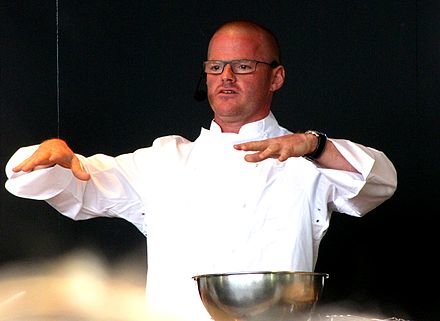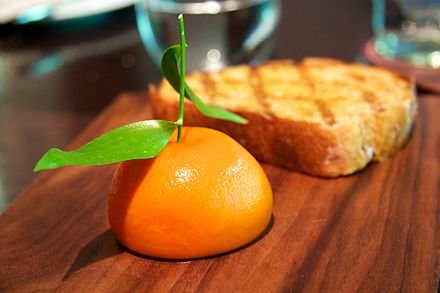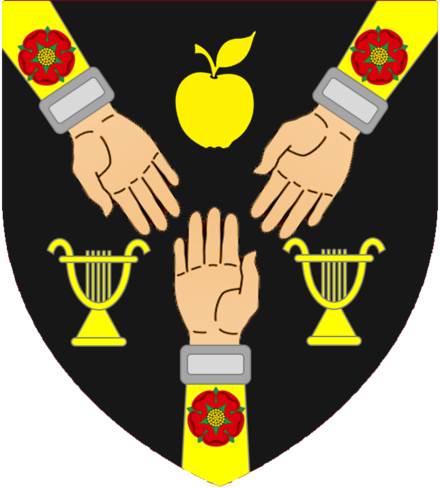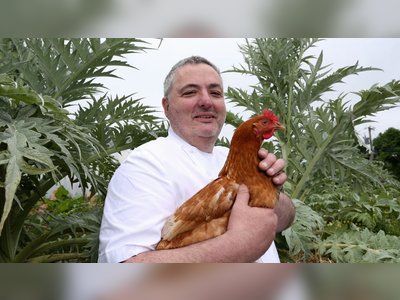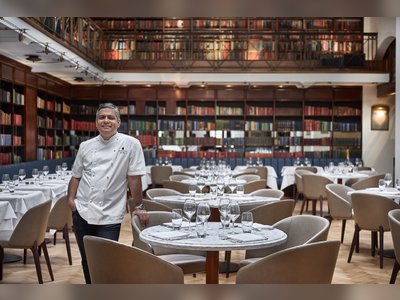British Heritage
Remember, Cherish, Learn.
beta
Heston Blumenthal
Contribution of Heston Blumenthal to British Heritage.
Heston Blumenthal, a renowned British celebrity chef, TV personality, and food writer, has made significant contributions to British heritage through his innovative and pioneering approach to cooking. Blumenthal's impact on the culinary world is marked by his groundbreaking techniques, multi-sensory cooking, and dedication to preserving and reinterpreting British culinary history. His restaurants, The Fat Duck and Dinner by Heston Blumenthal, have earned multiple accolades, including being named among the best restaurants globally. Blumenthal's commitment to merging science and art in the kitchen has not only elevated British gastronomy but also inspired a new generation of chefs and food enthusiasts worldwide.
Heston Marc Blumenthal was born on May 27, 1966, in Shepherd's Bush, London, to a Jewish father from Southern Rhodesia and an English mother who converted to Judaism. His interest in cooking blossomed at the age of sixteen during a family vacation to Provence, France, where he experienced the delights of a 3-Michelin-starred restaurant. This gastronomic encounter ignited his passion for the culinary arts, leading him to explore and experiment with various flavors and cooking techniques.
Blumenthal's culinary education was unconventional, as he taught himself the French classical repertoire while working day jobs, including credit controlling and repossessing. His turning point came when he encountered Harold McGee's seminal work, "On Food and Cooking: The Science and Lore of the Kitchen." This book challenged traditional kitchen practices and encouraged Heston to adopt a more scientific and questioning approach to cuisine.
In 1995, Blumenthal transformed a rundown pub in Bray, Berkshire, called the Ringers, into The Fat Duck, his flagship restaurant. It quickly gained the attention of food critics and enthusiasts alike, earning praise for its innovative and unconventional dishes. The Fat Duck's dishes, such as bacon-and-egg ice cream and snail porridge, showcased Blumenthal's penchant for combining unexpected ingredients and flavors.
Not content with just one culinary venture, Blumenthal acquired the Hind's Head, another Bray establishment, in 2004. This 15th-century tavern was reimagined as a place for traditional seasonal British cuisine and historic dishes. The Hind's Head was recognized as the Michelin Pub Guide's "Pub of the Year" in 2011.
Blumenthal's ambition extended beyond Bray, as he opened Dinner by Heston Blumenthal in January 2011 at the Mandarin Oriental Hyde Park, London. This restaurant delved into British culinary history, reviving and reinterpreting historical recipes with a modern twist. Dinner was awarded its first Michelin star in 2012 and became the 7th best restaurant in the world in 2013.
Blumenthal's scientific and multi-sensory approach to cooking has been instrumental in shaping contemporary cuisine. He introduced food pairing, a method of creating recipes based on identifying molecular similarities between different ingredients. Notable creations include white chocolate with caviar, roast foie gras "Benzaldehyde," and salmon poached in a liquorice gel accompanied by asparagus. Blumenthal's dishes often challenge diners' preconceptions, demonstrating the power of context and perception in taste experiences.
His dedication to multi-sensory cooking is evident in signature dishes like "Sound of the Sea." In this dish, diners listen to seaside sounds while enjoying a course featuring oceanic flavors and textures, creating an immersive dining experience that transcends taste alone.
Blumenthal's deep appreciation for British culinary heritage led him to delve into historical cookbooks and revive long-forgotten recipes. Through his collaboration with food historians Richard Fitch, Marc Meltonville, and Ivan Day, he developed dishes inspired by traditional British fare, connecting the past with the present on his restaurant menus. Notable examples include "Quaking Pudding," "Beef Royal," and "Chocolate Wine."
His commitment to historical cooking culminated in the opening of Dinner by Heston Blumenthal, which exclusively features dishes based on historical recipes. The restaurant's menu serves as a homage to British heritage while offering a modern twist that resonates with contemporary diners.
Blumenthal's exceptional contributions to gastronomy have been recognized through numerous awards and accolades. In 2004, he received the Chef Award at The Catey Awards, cementing his place among culinary luminaries like Gordon Ramsay and Raymond Blanc. His groundbreaking scientific approach to cooking earned him honorary degrees from prestigious institutions, including Reading University, Bristol University, and the University of London.
Blumenthal's culinary expertise has garnered royal recognition, and he has had the honor of cooking for Queen Elizabeth II on several occasions, including during Ascot week and the Queen's Diamond Jubilee celebrations. His inventive and artistic cooking style has left an indelible mark on British gastronomy, inspiring chefs worldwide to explore the boundaries of taste, flavor, and dining experiences.
Heston Blumenthal's legacy lies in his relentless pursuit of culinary innovation and his dedication to celebrating and preserving British culinary heritage. His restaurants, revolutionary cooking methods, and impact on the global culinary scene have solidified his position as one of Britain's most influential and celebrated chefs. Blumenthal's contributions to British heritage and gastronomy will undoubtedly continue to shape the world of food for generations to come.
Early Life and Culinary Journey
Heston Marc Blumenthal was born on May 27, 1966, in Shepherd's Bush, London, to a Jewish father from Southern Rhodesia and an English mother who converted to Judaism. His interest in cooking blossomed at the age of sixteen during a family vacation to Provence, France, where he experienced the delights of a 3-Michelin-starred restaurant. This gastronomic encounter ignited his passion for the culinary arts, leading him to explore and experiment with various flavors and cooking techniques.
Blumenthal's culinary education was unconventional, as he taught himself the French classical repertoire while working day jobs, including credit controlling and repossessing. His turning point came when he encountered Harold McGee's seminal work, "On Food and Cooking: The Science and Lore of the Kitchen." This book challenged traditional kitchen practices and encouraged Heston to adopt a more scientific and questioning approach to cuisine.
Career and Restaurant Ventures
In 1995, Blumenthal transformed a rundown pub in Bray, Berkshire, called the Ringers, into The Fat Duck, his flagship restaurant. It quickly gained the attention of food critics and enthusiasts alike, earning praise for its innovative and unconventional dishes. The Fat Duck's dishes, such as bacon-and-egg ice cream and snail porridge, showcased Blumenthal's penchant for combining unexpected ingredients and flavors.
Not content with just one culinary venture, Blumenthal acquired the Hind's Head, another Bray establishment, in 2004. This 15th-century tavern was reimagined as a place for traditional seasonal British cuisine and historic dishes. The Hind's Head was recognized as the Michelin Pub Guide's "Pub of the Year" in 2011.
Blumenthal's ambition extended beyond Bray, as he opened Dinner by Heston Blumenthal in January 2011 at the Mandarin Oriental Hyde Park, London. This restaurant delved into British culinary history, reviving and reinterpreting historical recipes with a modern twist. Dinner was awarded its first Michelin star in 2012 and became the 7th best restaurant in the world in 2013.
Innovative Cooking Methods
Blumenthal's scientific and multi-sensory approach to cooking has been instrumental in shaping contemporary cuisine. He introduced food pairing, a method of creating recipes based on identifying molecular similarities between different ingredients. Notable creations include white chocolate with caviar, roast foie gras "Benzaldehyde," and salmon poached in a liquorice gel accompanied by asparagus. Blumenthal's dishes often challenge diners' preconceptions, demonstrating the power of context and perception in taste experiences.
His dedication to multi-sensory cooking is evident in signature dishes like "Sound of the Sea." In this dish, diners listen to seaside sounds while enjoying a course featuring oceanic flavors and textures, creating an immersive dining experience that transcends taste alone.
Preservation of British Culinary History
Blumenthal's deep appreciation for British culinary heritage led him to delve into historical cookbooks and revive long-forgotten recipes. Through his collaboration with food historians Richard Fitch, Marc Meltonville, and Ivan Day, he developed dishes inspired by traditional British fare, connecting the past with the present on his restaurant menus. Notable examples include "Quaking Pudding," "Beef Royal," and "Chocolate Wine."
His commitment to historical cooking culminated in the opening of Dinner by Heston Blumenthal, which exclusively features dishes based on historical recipes. The restaurant's menu serves as a homage to British heritage while offering a modern twist that resonates with contemporary diners.
Awards and Recognition
Blumenthal's exceptional contributions to gastronomy have been recognized through numerous awards and accolades. In 2004, he received the Chef Award at The Catey Awards, cementing his place among culinary luminaries like Gordon Ramsay and Raymond Blanc. His groundbreaking scientific approach to cooking earned him honorary degrees from prestigious institutions, including Reading University, Bristol University, and the University of London.
Royal Patronage and Legacy
Blumenthal's culinary expertise has garnered royal recognition, and he has had the honor of cooking for Queen Elizabeth II on several occasions, including during Ascot week and the Queen's Diamond Jubilee celebrations. His inventive and artistic cooking style has left an indelible mark on British gastronomy, inspiring chefs worldwide to explore the boundaries of taste, flavor, and dining experiences.
Heston Blumenthal's legacy lies in his relentless pursuit of culinary innovation and his dedication to celebrating and preserving British culinary heritage. His restaurants, revolutionary cooking methods, and impact on the global culinary scene have solidified his position as one of Britain's most influential and celebrated chefs. Blumenthal's contributions to British heritage and gastronomy will undoubtedly continue to shape the world of food for generations to come.
- Heston Blumenthalen.wikipedia.org
